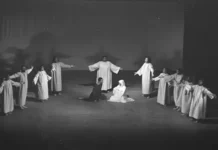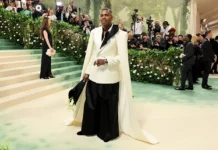
by Carl Cofield
Theater has always been a mirror reflecting society’s triumphs and tribulations. Yet, for centuries, that mirror has often failed to capture the richness and diversity of all its audiences. The Classical Theatre of Harlem stands as a beacon in the movement to change that narrative, drawing inspiration from Harlem’s cultural legacy and the enduring significance of the Harlem Renaissance. As the organization celebrates its 25th anniversary amid the centennial of the Harlem Renaissance, it reminds us of the urgent need to amplify Black voices in classical theater.
Black characters and stories have long existed in the classical canon, but they are too often overlooked, obscured by a Western-centric lens. By unearthing these narratives, CTH ensures that audiences experience the full spectrum of human stories and the complexities of the Black experience.
Traditional Western theater has historically prioritized white, European narratives, leaving little room for diverse perspectives. This exclusion has created cultural gaps, depriving Black audiences of seeing their stories reflected in classical works. The lack of representation also narrows the perspectives of other audiences, fostering a theater landscape that falls short of its potential to inspire empathy and understanding.
CTH is taking bold strides to address this imbalance by spotlighting Black characters who deserve a place on the classical stage. Take, for instance, Memnon, the Ethiopian king who fought at Troy. In July 2025, CTH will present the New York premiere of Memnon, a production helmed by myself and written by Will Power. This narrative revival brings to life a story steeped in heroism and African history, enriching the classical canon with a fresh perspective.
Other Black characters already within the canon, such as Shakespeare’s Othello, bring nuance to exploring race, jealousy, and identity. Meanwhile, characters like Brutus Jones and Beneatha Younger delve into power dynamics, self-discovery, and the search for independence. Works like Joe Turner’s Come and Gone reflect the enduring struggles of identity and freedom post-slavery.
From Hester to Sethe to The African, these characters collectively dismantle stereotypes, showcasing Black individuals as complex and multidimensional — heroes, dreamers, leaders, and survivors.
Representation matters not only for Black audiences but for everyone.
Bringing Black voices to the stage enriches the narrative landscape and builds bridges of understanding. Diverse stories allow audiences to engage with Black history and culture in ways that transcend textbooks and stereotypes. By seeing Black characters take center stage, audiences are challenged to rethink ingrained biases and embrace a broader human experience.
Today, the themes explored by these characters resonate powerfully with modern issues, from racial justice to identity and resilience. Their stories inspire future generations of Black artists, proving that their history and heritage deserve recognition on the world’s stage. Representation matters not only for Black audiences but for everyone — it validates that art thrives when it reflects the breadth of human experiences.

Theater companies have a responsibility to do more than diversify their casts; they must be intentional about the stories they choose to tell. This includes revisiting the classical canon through an inclusive lens and commissioning works that elevate overlooked narratives.
CTH leads this charge through its innovative arts education initiative, Project Classics, which introduces Harlem youth to classical theater. Programs like this ensure the next generation sees their stories as vital, beautiful, and worthy of being told.
As CTH looks toward the future, its ambitions extend beyond the stage. The organization’s goal of establishing a permanent home in Harlem underscores its commitment to being a cultural pillar for the community. Black voices in the performing arts can flourish for generations in this space.
In supporting CTH and other theaters celebrating diversity, audiences, artists, and institutions contribute to a richer, more inclusive cultural landscape. The stage is set. Now is the time to step into the spotlight and champion the stories that make us all more empathetic and connected.
Carl Cofield is associate artistic director for CTH and directed several plays for the organization before joining as a staff member in 2018. Notable directing credits for CTH include the critically acclaimed productions of The Bacchae, Antigone, Macbeth, The Tempest, and Dutchman. In addition, he directed the award-winning world premiere of One Night In Miami for Rogue Machine Theater and the Denver Center Theatre, A Raisin In the Sun for Two River Theater Company, The Mountaintop for Cleveland Play House, Disgraced for The Denver Center and Henry IV Part 2 for the Oregon Shakespeare Festival, A Midsummer Night’s Dream for NYU and Twelfth Night for Yale Rep. He holds an MFA from Columbia University. Mr. Cofield is on the faculty at NYU and Columbia University.















